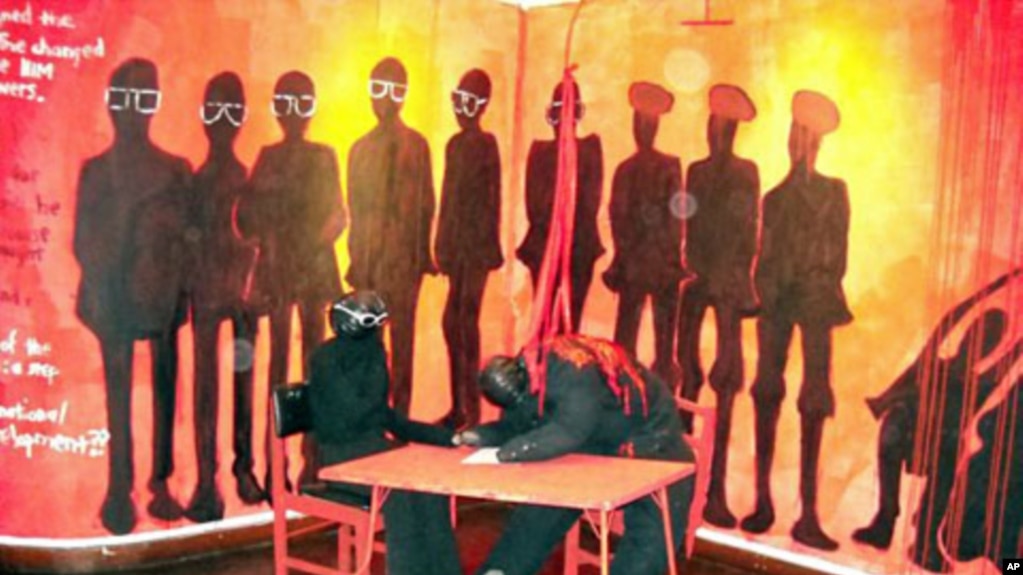My Painful Poetry

Its rhymes are of the
poverty stripped widows in Liberia.
Its symbols are of the slain cops freezing on the mortuary slabs of Gambia
Its imagery is of freedom succumbing within bomb cry in Nigeria
Its sound is of poverty shriveled breasts of mothers in Eritrea
Its surprise is of hunger tortured children in Ethiopia
Its echo is of war caused orphans digging for fortunes and future in rubbish dumps of
Somalia
My painful poetry
Its connotations are of the weeping of ethnic tribes in Libya
Its voice is of groaning stomachs of banks in Namibia
Its tragedy is of sewage pipes gushing out disgusting contents in the streets of Zambia
Its metaphors are machetes slicing wombs in the valleys of Katanga
Its similes are of blood stained walls of sufferance in Tanzania
Its alliterations are of genocides and atrocities in Rwandan corridors
Its resonance is of butchers and slaughters in Burundian drives
My painful poetry
Its beat is of apartheid explosions in South Africa
Its allegory is of the crying of the Povo in Zimbabwe
Its satire is of the inking of villages in Mozambique
Its irony is barter exchange of diamonds and rifles in Angola
Its epitaph is the dying of the cultures in Algeria
My painful poetry is painful and never beautiful
Its symbols are of the slain cops freezing on the mortuary slabs of Gambia
Its imagery is of freedom succumbing within bomb cry in Nigeria
Its sound is of poverty shriveled breasts of mothers in Eritrea
Its surprise is of hunger tortured children in Ethiopia
Its echo is of war caused orphans digging for fortunes and future in rubbish dumps of
Somalia
My painful poetry
Its connotations are of the weeping of ethnic tribes in Libya
Its voice is of groaning stomachs of banks in Namibia
Its tragedy is of sewage pipes gushing out disgusting contents in the streets of Zambia
Its metaphors are machetes slicing wombs in the valleys of Katanga
Its similes are of blood stained walls of sufferance in Tanzania
Its alliterations are of genocides and atrocities in Rwandan corridors
Its resonance is of butchers and slaughters in Burundian drives
My painful poetry
Its beat is of apartheid explosions in South Africa
Its allegory is of the crying of the Povo in Zimbabwe
Its satire is of the inking of villages in Mozambique
Its irony is barter exchange of diamonds and rifles in Angola
Its epitaph is the dying of the cultures in Algeria
My painful poetry is painful and never beautiful

Signing the Unity Accord -- Owen Maseko
The Maseko painting depicts the end of factional strife in Zimbabwe. Joshua Nkomo, of the Ndebele tribe, founded the Southern Rhodesia African National Congress in 1957. After it was banned he organized the more radical National Democratic Party in 1960; its 1st congress was chaired by Robert Mugabe, a Shona, who was then named the group's publicity secretary. In 1961 Nkomo agreed to a British proposal that would have allowed the majority black population 15 seats in parliament compared to the white minority's 50. Mugabe led the opposition to the compromise. Ten days after the NDP was banned at the end of the year, Nkomo founded ZAPU (Zimbabwe African People's Union), with Mugabe as information & publicity secretary and general secretary. Nkomo sought to focus on international diplomacy to pressure the UK, while Mugabe encouraged racial violence. ZAPU was banned in 1962 and its leadership, in exile or under house arrest, continued to quarrel over tactics, with Nkomo seeking to form a government in exile and Mugabe supporting armed resistance. When the anti-Nkomo faction founded ZANU (Zimbabwe National Union) gang warfare erupted. From 1964 to 1974 both Nkomo and Mugabe were imprisoned at Gonakudzingwa ("where the banished ones sleep") Restriction Camp, and they resumed their revolutionary activity after their release. While the ZAPU/ZANU leaders were jailed, Ian Smith declared Southern Rhodesia's independence as Rhodesia, but in 1979 the UK chaired new negotiations between Smith, Nkomo, and Mugame. Elections in 1980 gave Mugabe most of the parliamentary seats in the new nation (Zimbabwe); he ruled the country as prime minister; Nkomo refused the ceremonial post of president but he accepted the ministry of home affairs. He was demoted to minister without portfolio the following year and then accused of plotting a coup. Mugabe established the north Korean-trained Fifth brigade, which launched the Gukurahundi (Shona for "wind that sweeps away the chaff before the rains"), which led to the slayings of some 20,000 Ndabele. In 1987 Nkomo consented to the absorption of ZAPU into ZANU, resulting in a unified party called Zimbabwe African National Union - Patriotic Front and accepted the position as second vice-president under Mugabe, the president under the new constitution. (The first vice-presidency has been reserved for a Shona candidacy, and the second vice-presidency for a Ndebele, but their positions primarily reflected the presidential order of succession rather than any genuine authority). In 2010 Mugabe arrested Maseko, charged him with insulting the authority of the president, and banned his art.
ReplyDelete